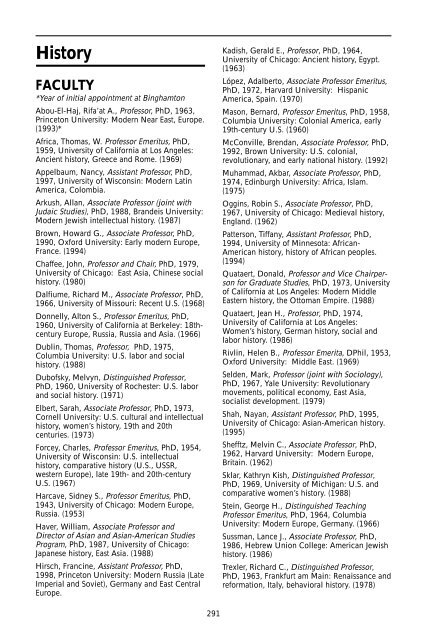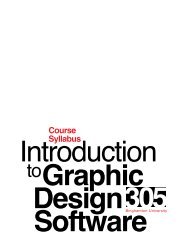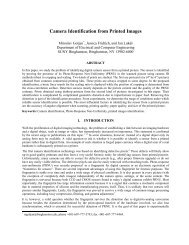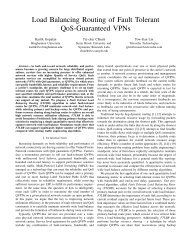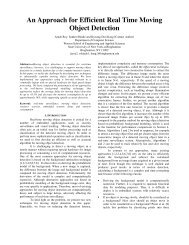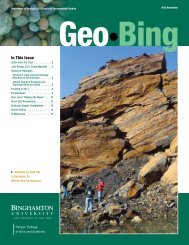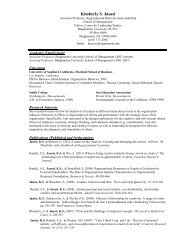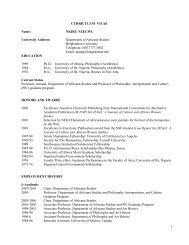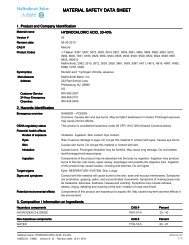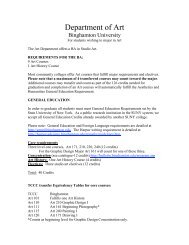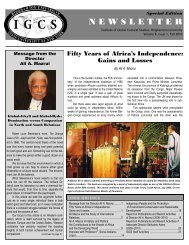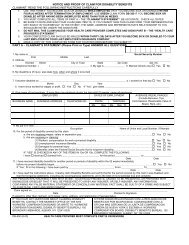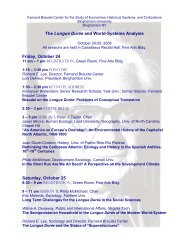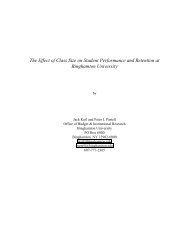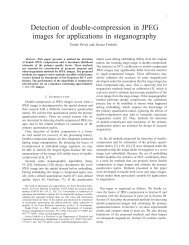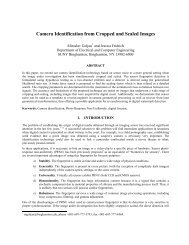History - Binghamton University
History - Binghamton University
History - Binghamton University
Create successful ePaper yourself
Turn your PDF publications into a flip-book with our unique Google optimized e-Paper software.
<strong>History</strong><br />
FACULTY<br />
*Year of initial appointment at <strong>Binghamton</strong><br />
Abou-El-Haj, Rifa’at A., Professor, PhD, 1963,<br />
Princeton <strong>University</strong>: Modern Near East, Europe.<br />
(1993)*<br />
Africa, Thomas, W. Professor Emeritus, PhD,<br />
1959, <strong>University</strong> of California at Los Angeles:<br />
Ancient history, Greece and Rome. (1969)<br />
Appelbaum, Nancy, Assistant Professor, PhD,<br />
1997, <strong>University</strong> of Wisconsin: Modern Latin<br />
America, Colombia.<br />
Arkush, Allan, Associate Professor (joint with<br />
Judaic Studies), PhD, 1988, Brandeis <strong>University</strong>:<br />
Modern Jewish intellectual history. (1987)<br />
Brown, Howard G., Associate Professor, PhD,<br />
1990, Oxford <strong>University</strong>: Early modern Europe,<br />
France. (1994)<br />
Chaffee, John, Professor and Chair, PhD, 1979,<br />
<strong>University</strong> of Chicago: East Asia, Chinese social<br />
history. (1980)<br />
Dalfiume, Richard M., Associate Professor, PhD,<br />
1966, <strong>University</strong> of Missouri: Recent U.S. (1968)<br />
Donnelly, Alton S., Professor Emeritus, PhD,<br />
1960, <strong>University</strong> of California at Berkeley: 18thcentury<br />
Europe, Russia, Russia and Asia. (1966)<br />
Dublin, Thomas, Professor, PhD, 1975,<br />
Columbia <strong>University</strong>: U.S. labor and social<br />
history. (1988)<br />
Dubofsky, Melvyn, Distinguished Professor,<br />
PhD, 1960, <strong>University</strong> of Rochester: U.S. labor<br />
and social history. (1971)<br />
Elbert, Sarah, Associate Professor, PhD, 1973,<br />
Cornell <strong>University</strong>: U.S. cultural and intellectual<br />
history, women’s history, 19th and 20th<br />
centuries. (1973)<br />
Forcey, Charles, Professor Emeritus, PhD, 1954,<br />
<strong>University</strong> of Wisconsin: U.S. intellectual<br />
history, comparative history (U.S., USSR,<br />
western Europe), late 19th- and 20th-century<br />
U.S. (1967)<br />
Harcave, Sidney S., Professor Emeritus, PhD,<br />
1943, <strong>University</strong> of Chicago: Modern Europe,<br />
Russia. (1953)<br />
Haver, William, Associate Professor and<br />
Director of Asian and Asian-American Studies<br />
Program, PhD, 1987, <strong>University</strong> of Chicago:<br />
Japanese history, East Asia. (1988)<br />
Hirsch, Francine, Assistant Professor, PhD,<br />
1998, Princeton <strong>University</strong>: Modern Russia (Late<br />
Imperial and Soviet), Germany and East Central<br />
Europe.<br />
291<br />
Kadish, Gerald E., Professor, PhD, 1964,<br />
<strong>University</strong> of Chicago: Ancient history, Egypt.<br />
(1963)<br />
López, Adalberto, Associate Professor Emeritus,<br />
PhD, 1972, Harvard <strong>University</strong>: Hispanic<br />
America, Spain. (1970)<br />
Mason, Bernard, Professor Emeritus, PhD, 1958,<br />
Columbia <strong>University</strong>: Colonial America, early<br />
19th-century U.S. (1960)<br />
McConville, Brendan, Associate Professor, PhD,<br />
1992, Brown <strong>University</strong>: U.S. colonial,<br />
revolutionary, and early national history. (1992)<br />
Muhammad, Akbar, Associate Professor, PhD,<br />
1974, Edinburgh <strong>University</strong>: Africa, Islam.<br />
(1975)<br />
Oggins, Robin S., Associate Professor, PhD,<br />
1967, <strong>University</strong> of Chicago: Medieval history,<br />
England. (1962)<br />
Patterson, Tiffany, Assistant Professor, PhD,<br />
1994, <strong>University</strong> of Minnesota: African-<br />
American history, history of African peoples.<br />
(1994)<br />
Quataert, Donald, Professor and Vice Chairperson<br />
for Graduate Studies, PhD, 1973, <strong>University</strong><br />
of California at Los Angeles: Modern Middle<br />
Eastern history, the Ottoman Empire. (1988)<br />
Quataert, Jean H., Professor, PhD, 1974,<br />
<strong>University</strong> of California at Los Angeles:<br />
Women’s history, German history, social and<br />
labor history. (1986)<br />
Rivlin, Helen B., Professor Emerita, DPhil, 1953,<br />
Oxford <strong>University</strong>: Middle East. (1969)<br />
Selden, Mark, Professor (joint with Sociology),<br />
PhD, 1967, Yale <strong>University</strong>: Revolutionary<br />
movements, political economy, East Asia,<br />
socialist development. (1979)<br />
Shah, Nayan, Assistant Professor, PhD, 1995,<br />
<strong>University</strong> of Chicago: Asian-American history.<br />
(1995)<br />
Shefftz, Melvin C., Associate Professor, PhD,<br />
1962, Harvard <strong>University</strong>: Modern Europe,<br />
Britain. (1962)<br />
Sklar, Kathryn Kish, Distinguished Professor,<br />
PhD, 1969, <strong>University</strong> of Michigan: U.S. and<br />
comparative women’s history. (1988)<br />
Stein, George H., Distinguished Teaching<br />
Professor Emeritus, PhD, 1964, Columbia<br />
<strong>University</strong>: Modern Europe, Germany. (1966)<br />
Sussman, Lance J., Associate Professor, PhD,<br />
1986, Hebrew Union College: American Jewish<br />
history. (1986)<br />
Trexler, Richard C., Distinguished Professor,<br />
PhD, 1963, Frankfurt am Main: Renaissance and<br />
reformation, Italy, behavioral history. (1978)
Wagar, W. Warren, Distinguished Teaching<br />
Professor and Director of Undergraduate<br />
Studies, PhD, 1959, Yale <strong>University</strong>: European<br />
intellectual history, alternative futures. (1971)<br />
Williman, Daniel, Professor (joint with Classics),<br />
PhD, 1973, <strong>University</strong> of Toronto: Medieval<br />
history. (1974)<br />
UNDERGRADUATE<br />
PROGRAMS<br />
The history curriculum promotes inquiry into<br />
the origins and development of human society.<br />
It also exposes students to the varieties of<br />
historical thinking. The program offers a balance<br />
between humanistic approaches to the study of<br />
the human experience and approaches based on<br />
the methods of the social and behavioral<br />
sciences.<br />
<strong>History</strong> Department courses are offered at<br />
three levels.<br />
1. Introductory courses: courses on the 100<br />
level; general introductions to and overviews of<br />
the history of a particular area or region (e.g.,<br />
general views of European, United States,<br />
Islamic, Far Eastern, African, and Latin<br />
American history). Open to all students (history<br />
majors and minors taking 100-level courses<br />
normally do so before their junior year). May be<br />
taken in any sequence.<br />
2. Intermediate courses: courses on the 200<br />
and the 300 levels. Courses on the 200 level are<br />
more specialized analyses of eras and themes.<br />
Courses on the 300 level are intensive examinations<br />
of a particular era or theme taught in a<br />
lecture-discussion format. For 300-level courses,<br />
the normal prerequisite is sophomore standing.<br />
3. Advanced courses: courses on the 400<br />
level. Courses on the 400 level (with the<br />
exception of HIST 498 and 499) are senior<br />
seminars in which a research paper is required.<br />
For 400-level courses, the normal prerequisite is<br />
junior standing.<br />
Students planning to major or minor in<br />
history should consult, as early as possible, with<br />
the departmental director of undergraduate<br />
studies. <strong>History</strong> majors and minors should visit<br />
this office whenever they need advice on their<br />
programs. The <strong>History</strong> Department does not<br />
require that majors or minors specialize or<br />
concentrate in any area, period or type of<br />
history. Some students, however, may wish to<br />
create an ad hoc concentration by taking several<br />
courses in one field, such as the United States,<br />
Europe, the Third World, ancient history,<br />
modern history, social and economic history<br />
and the like. Those who do may seek advice<br />
from the director of undergraduate studies. The<br />
department accepts up to two history courses<br />
taken at other colleges in fulfillment of the<br />
requirements for the minor and up to four<br />
292<br />
history courses taken at another college in<br />
fulfillment of the requirements for the major.<br />
The department does not accept advanced<br />
placement credit, CLEP credit or course credit<br />
by examination in fulfillment of the requirements<br />
for the major or the minor.<br />
Requirements for<br />
<strong>History</strong> Major<br />
The Department of <strong>History</strong> requires for the<br />
major a minimum of 10 courses distributed as<br />
follows:<br />
1. Four courses: one from each of the<br />
following areas: (1) United States, (2) Europe, (3)<br />
a third area, e.g., Middle East, Asia, Africa, Latin<br />
America; and (4) world history or interregionally<br />
comparative history.<br />
2. At least three 300- or 400-level courses,<br />
one of which must be a senior seminar (HIST<br />
400 through 487A-Z) or HIST 492. The senior<br />
seminar may not be taken under the Pass/Fail<br />
option.<br />
3. At least three other history courses. HIST<br />
101, 102, 103 and 104 do not count toward the<br />
major when taken by students in their junior<br />
and senior years. Furthermore, no more than<br />
two courses may be counted from among the<br />
above listed courses to satisfy this requirement.<br />
4. No more than one course of HIST 397,<br />
Independent Study, may be used to satisfy the<br />
total requirements for the major. Only one<br />
course taken under the Pass/Fail option will be<br />
credited to the major. HIST 395 does not count<br />
toward the major.<br />
5. The <strong>History</strong> Department views the grade<br />
of D as passing but unsatisfactory. Courses<br />
passed with a grade of D do not fulfill requirements<br />
for the major.<br />
Honors Program<br />
The director of undergraduate studies administers<br />
the honors program offered by the Department of<br />
<strong>History</strong>. Candidates for honors must consult with<br />
the director and complete a form kept in the<br />
Harpur College undergraduate advising office.<br />
To be eligible to earn honors, a history<br />
major:<br />
1. must have a GPA of 3.60 in history, not<br />
counting courses taken Pass/Fail;<br />
2. must have taken at least one senior<br />
seminar in which the student earned a<br />
grade of A or A–.<br />
Both of these conditions must be satisfied by<br />
the end of the student’s penultimate semester.<br />
In addition, the student must either write an<br />
honors thesis or take a written comprehensive<br />
examination. Whichever of these options is<br />
chosen, the work must be judged worthy of<br />
honors (Honors, High Honors or Highest<br />
Honors) by the faculty supervisor and one other
member of the department (or a faculty member<br />
outside the department approved by the<br />
undergraduate director). In case of disagreement<br />
between the two readers, a third will be<br />
designated by the undergraduate director. This<br />
work may be completed during the student’s last<br />
semester.<br />
THESIS OPTION<br />
The student must arrange with a faculty member<br />
in the <strong>History</strong> Department to supervise the<br />
research and writing of a thesis, and with a<br />
second member of the department to read the<br />
thesis. Students writing an honors thesis may<br />
(but are not required to) register for HIST 498<br />
and 499. These courses may not be used to<br />
satisfy the history major requirement. For more<br />
information, the student should refer to the<br />
“Rules Governing the Preparation of Undergraduate<br />
Honors Theses,” available from the<br />
undergraduate director.<br />
EXAMINATION OPTION<br />
Students interested in this option choose a<br />
mentor from the faculty of the department and<br />
take courses on the advice of the mentor.<br />
Normally, students are expected to take at least<br />
four history courses in the area to be examined<br />
(e.g., ancient history, French history, modern<br />
U.S. history or East Asian history). The area is<br />
defined jointly by the mentor and the student.<br />
The mentor prepares and grades the examination,<br />
as does one other member of the department.<br />
<strong>History</strong> Minor<br />
The purpose of the history minor is to encourage<br />
students to supplement their major in another<br />
discipline with a coherent program in history.<br />
Each student develops a program to satisfy the<br />
minor requirements in consultation with the<br />
department’s advisers. The general requirements<br />
are:<br />
1. A minimum of six history courses (24<br />
hours).<br />
2. No more than two introductory-level<br />
(HIST 101 through 104) and one independent<br />
study courses may be counted. Introductory<br />
courses taken during the junior or senior year do<br />
not count towards the minor. Only one course<br />
taken under the Pass/Fail option will be credited<br />
toward the minor.<br />
3. At least two 300- or 400-level courses,<br />
one of which must be a senior seminar (HIST<br />
400 through HIST 486 A-Z) or HIST 492. The<br />
senior seminar may not be taken under the Pass/<br />
Fail option. HIST 395 does not count towards<br />
the minor.<br />
4. At least four of the courses in the history<br />
minor program must be in addition to history<br />
293<br />
courses counted toward fulfillment of the<br />
student’s major.<br />
5. At least four of the six courses counting<br />
towards the minor must be taken at <strong>Binghamton</strong>.<br />
6. The <strong>History</strong> Department views the grade of<br />
D as passing but unsatisfactory. Courses passed<br />
with a grade of D do not fulfill requirements for<br />
the minor.<br />
GRADUATE PROGRAMS<br />
The department offers programs leading both to<br />
the MA and to the PhD degrees. Work toward<br />
the doctoral degree emphasizes the development<br />
of the high level of professional competence<br />
essential to college and university<br />
teaching of history and to mature research in the<br />
discipline.<br />
At present the <strong>History</strong> Department offers<br />
advanced work in the following fields:<br />
1. United States <strong>History</strong><br />
2. Ancient <strong>History</strong><br />
3. Medieval <strong>History</strong><br />
4. Europe Since 1450<br />
5. Russian and East European <strong>History</strong><br />
6. Middle Eastern <strong>History</strong><br />
7. <strong>History</strong> of Women (U.S. or European)<br />
8. East Asian <strong>History</strong><br />
9. Latin American <strong>History</strong><br />
10. African <strong>History</strong><br />
11. Jewish <strong>History</strong><br />
With the consultation of appropriate advisers<br />
and the approval of the graduate committee, a<br />
student may design a special program around<br />
departmental course offerings and relevant<br />
comparative and interdisciplinary studies.<br />
Another option is one of the certificate programs<br />
(medieval studies, LACAS or SWANA), which<br />
may be taken in conjunction with the PhD<br />
program in history. For the joint MBA/MA in<br />
history program, see the statement of the School<br />
of Management. In addition, it is possible,<br />
particularly in doctoral work, to develop other<br />
programs that integrate the historian’s analytical<br />
and conceptual abilities with the demands and<br />
expectations of related nonacademic professions.<br />
Requirements<br />
ADMISSION<br />
Applicants for admission to graduate work in<br />
history are required to submit their scores in the<br />
Graduate Record Examinations, an example of<br />
their written work (e.g., a paper submitted in an<br />
advanced undergraduate or graduate course)<br />
and a statement of their interests and career<br />
goals.
ADVISER AND GUIDANCE<br />
COMMITTEE<br />
Students are advised by staff or a faculty<br />
member in their field of concentration during<br />
their first semester in the graduate program.<br />
Before the beginning of the second semester,<br />
the student selects an appropriate member of<br />
the faculty as principal adviser (sponsor) and<br />
chair of a guidance committee. The student in<br />
consultation with the principal adviser solicits<br />
two additional faculty members to serve on the<br />
guidance committee. The chairperson of the<br />
guidance committee, with the assistance of<br />
colleagues and the vice chairperson for graduate<br />
studies, aids students in their choices of courses,<br />
advises them on the fulfillment of other<br />
academic requirements and in general guides<br />
them through the graduate program. Normally,<br />
the guidance committee forms the core of the<br />
student’s oral comprehensive examination<br />
committee. In most cases, too, a student’s<br />
guidance committee eventually serves as a<br />
three-person dissertation committee.<br />
Normally, full-time matriculated students<br />
take three courses per semester. A student’s<br />
coursework should be closely correlated with<br />
the proposed major and minor fields, and<br />
should include a balance between general<br />
colloquia and specialized research seminars.<br />
Students are encouraged to work with a number<br />
of different professors to broaden their exposure<br />
to different historical styles, methods and<br />
theories. In addition to the work completed for<br />
their courses, students are expected to pursue a<br />
coherent program of readings in preparation for<br />
their comprehensive examinations. Independent<br />
readings courses may be arranged with<br />
individual instructors to cover special topics,<br />
but must not be used to satisfy more than onethird<br />
of a student’s degree requirements.<br />
No faculty member is required to accept a<br />
particular student as an advisee. By the same<br />
token, a student may, for reasonable cause,<br />
petition the vice chairperson for graduate<br />
studies for a change of principal adviser or<br />
guidance committee.<br />
Master of Arts Program<br />
The master of arts in history is granted on<br />
completion of the following requirements.<br />
COURSE REQUIREMENTS<br />
Thirty-two graduate credit hours, with a B<br />
average or better. Specialization in one of the<br />
following fields: Europe since 1450, United<br />
States history, ancient history, medieval history,<br />
Middle Eastern history, Russian and East<br />
European history, Latin American history,<br />
African history, East Asian history, history of U.S.<br />
women, history of European women, or Jewish<br />
294<br />
history. In addition, all master’s students are<br />
required to take HIST 592 (Historiography) and<br />
one 600-level research seminar. Master’s-level<br />
students who choose to write a master’s thesis<br />
are not required to take the 600-level research<br />
seminar for the master’s degree. All master’s<br />
students must pass the master’s examination.<br />
Twenty-four of the credits offered must be<br />
taken in residence.<br />
FOREIGN LANGUAGE<br />
REQUIREMENT<br />
Master’s level students in non-U.S. history must<br />
meet the language requirement at the master’s<br />
level.<br />
THESIS AND NONTHESIS OPTIONS<br />
With the approval of the guidance committee, a<br />
student either elects to write a master’s thesis<br />
that demonstrates scholarly ability, or satisfactorily<br />
completes up to eight additional credit<br />
hours in history or in a related discipline.<br />
MASTER’S EXAMINATION<br />
The master’s examination is a three-hour written<br />
examination in the student’s field of specialization.<br />
Examinations are offered once each<br />
semester, and should be taken during the<br />
semester in which the student completes all<br />
other degree requirements.<br />
Doctor of Philosophy<br />
Program<br />
ADMISSION<br />
Admission to the PhD program is determined by<br />
the department when the student has completed<br />
work for the MA degree or its equivalent. All<br />
students who enter the program with an MA<br />
degree in history from another institution will<br />
have their work reviewed by the department at<br />
the end of their first semester to confirm their<br />
admission to the doctoral program.<br />
ADMISSION TO CANDIDACY<br />
At least two semesters must elapse between<br />
admission to candidacy and the granting of the<br />
degree. Requirements are as follows:<br />
1. Coursework. Not fewer than 56 graduate<br />
credits (excluding credit for the dissertation, but<br />
including credits earned toward the MA), with<br />
an average of B+, as follows:<br />
Courses in a major field<br />
Courses in two minor fields<br />
HIST 592*<br />
Two 600-level research seminars (one of<br />
which must have been taken at the<br />
master’s level)<br />
*Students are encouraged to fulfill the requirement<br />
of HIST 592, Historiography, early in their program.
2. Languages. All PhD students must<br />
demonstrate proficiency in a language other<br />
than their native language; the language will be<br />
determined by the student in consultation with<br />
his or her guidance committee. The guidance<br />
committee may also require additional<br />
languages necessary for scholarship in the<br />
student’s field. Quantitative methods or other<br />
courses may satisfy the language requirement for<br />
students who specialize in anglophone areas, as<br />
determined by the student’s guidance committee.<br />
3. Comprehensive Examination. Satisfactory<br />
completion of a comprehensive oral examination<br />
covering the student’s major and two minor<br />
fields. A major field consists of one of the<br />
divisions designated below with lowercase<br />
letters. The graduate committee may approve a<br />
special major such as comparative social,<br />
intellectual or labor history. Minor fields must<br />
be subdivisions (marked with Arabic numerals)<br />
of any field other than the major. At present,<br />
those fields listed below under “j. Other’’ can be<br />
offered only as minor fields. With the approval<br />
of the student’s guidance committee, the second<br />
minor may be a topical field cutting across<br />
chronological and geographical boundaries, or<br />
work in another discipline. The distribution of<br />
courses between the two minor fields is<br />
determined by the student’s guidance committee.<br />
The three-hour oral comprehensive<br />
examination tests both the major and the minor<br />
fields. Students are expected to take the<br />
examination during the semester in which their<br />
coursework is completed, and no later than the<br />
third year of full-time graduate study.<br />
a. Medieval <strong>History</strong><br />
1) Early Middle Ages (300-1050)<br />
2) High and Later Middle Ages (1050-1500)<br />
b. Modern <strong>History</strong> of Western Europe<br />
(including British <strong>History</strong>)<br />
1) 1450-1648<br />
2) 1600-1815<br />
3) 1789 to present<br />
c. Russian and Eastern European <strong>History</strong><br />
1) Early (before 1700)<br />
2) Modern (since 1700)<br />
d. United States <strong>History</strong><br />
1) Before 1876<br />
2) Since 1860<br />
e. Middle Eastern <strong>History</strong><br />
1) Ancient Near East<br />
2) Islamic World to 1258<br />
3) Islamic World 1258-1789<br />
4) Modern Middle East<br />
f. <strong>History</strong> of American Women<br />
g. <strong>History</strong> of European Women<br />
h. Jewish <strong>History</strong><br />
1) Medieval (before 1492)<br />
2) Modern (since 1492)<br />
i. East Asian <strong>History</strong><br />
295<br />
j. Other<br />
1) African <strong>History</strong><br />
2) Ancient <strong>History</strong><br />
3) Latin American <strong>History</strong><br />
4) Topical and comparative fields (e.g.,<br />
popular culture, social theory, social<br />
movements, psychohistory, etc.)<br />
4. Dissertation Prospectus. Presentation of an<br />
acceptable prospectus is assumed to be part of<br />
the PhD oral comprehensive examination.<br />
Students may, in consultation with their<br />
guidance committees, separate their prospectus<br />
presentation from the comprehensive examination;<br />
in such cases, they must have a colloquium<br />
on the prospectus within three months of<br />
the PhD oral comprehensive examination. If<br />
necessary, revisions to the prospectus may be<br />
made following the comprehensive examination<br />
or prospectus colloquium. The final prospectus<br />
must in any case be on file in the department<br />
within six months of passing the comprehensive<br />
examination.<br />
5. PhD Candidacy. Students are officially<br />
admitted to candidacy for the PhD degree upon<br />
satisfactory completion of the oral comprehensive<br />
examination. Candidates for the PhD<br />
degree must maintain registration (dissertation<br />
or continuous) until all the degree requirements<br />
are completed. (See also the Graduate School<br />
policy statement.)<br />
GRANTING OF THE DEGREE<br />
The PhD in history is granted, after admission to<br />
candidacy, on successful completion of the<br />
following requirements:<br />
1. Submission of a dissertation approved by<br />
the candidate’s dissertation committee. The<br />
dissertation must present a new interpretation of<br />
a familiar subject, or an investigation of a<br />
subject hitherto neglected, and must be written<br />
under the supervision of a member of the<br />
graduate faculty.<br />
2. Successful defense of the dissertation in<br />
an oral examination.<br />
WAIVER OF REGULATIONS AND<br />
REQUIREMENTS<br />
The department reserves the right to alter these<br />
regulations and requirements without notice,<br />
pending the publication of the next scheduled<br />
issue of this Bulletin.
COURSE OFFERINGS/<br />
UNDERGRADUATE<br />
NOTE: Unless otherwise noted, all undergraduate courses<br />
carry 4 credits and are offered every year.<br />
HIST 101. FOUNDATIONS OF WESTERN<br />
CIVILIZATION<br />
Development of western ideas and institutions from<br />
beginnings of Greek civilization to Europe of 1500.<br />
Significant aspects of culture, society, politics that have<br />
shaped modern world.<br />
HIST 102. THE MAKING OF THE MODERN WORLD<br />
Western civilization traced in its development from 1500<br />
to present times, with emphasis on Europe, Europeans,<br />
their relationships to other peoples.<br />
HlST 103. FOUNDATIONS OF AMERICAN<br />
CIVILIZATION<br />
Colonial period to 1877: American historical development<br />
in terms of distribution of power among social<br />
classes, dilemmas facing revolutionaries and reformers,<br />
origins of racial oppression, ways by which social changes<br />
have occurred.<br />
HIST 104. MODERN AMERICAN CIVILIZATION<br />
Development of American civilization from latter part of<br />
19th century to present. Agrarianism, capitalism, industrialism,<br />
racism, urbanization, immigration, colonial imperialism<br />
and world power, reform and reaction, corporate<br />
economy and corporate state, modern American<br />
expansionism.<br />
HIST 106 (also AAAS 106). INTRODUCTION TO EAST<br />
ASIAN CIVILIZATIONS<br />
Introduction to civilizations of China, Japan and Korea—<br />
their geographical settings, historical traditions and cultures—focusing<br />
on problems of interpretation. The idea<br />
of East Asia (or the Far East) in Western and Asian thought.<br />
Commonality vs. diversity: the common heritage of Buddhism,<br />
Taoism and Confucianism, of Chinese political<br />
thought, of Western imperialism and of modern industrialization,<br />
versus radical national and regional differences<br />
within East Asia.<br />
HIST 121. THE MIDDLE EAST SINCE 1453 2000-2001<br />
Great Muslim empires of the Middle East in their heyday<br />
and ascendancy over Europe, in eras of decentralization,<br />
of reform and Westernization and in period of their final<br />
disintegration, c. 1918. Twentieth century age of Western<br />
domination, of movements against imperialism and colonialism,<br />
and the rise of Arab, Turkish, Iranian and other<br />
nationalisms.<br />
HIST 130. MODERN WORLD HISTORY<br />
A thematic exploration of global history in the period<br />
1500-present and the ways in which societies and peoples<br />
have confronted fundamental issues of the human condition.<br />
The course examines developments in China, India,<br />
Africa, the Middle East, Europe and the Americas. Themes<br />
include: the impact of the European conquest of the New<br />
World; industrial transformations; subjects and citizens;<br />
revolts and revolutions, nationalisms; wars and<br />
decolonization; globalization.<br />
296<br />
HIST 176. INTRODUCTION TO AFRICAN HISTORY<br />
African social, political and economic history from the<br />
Pharaonic period to mid-20th century. Social, political<br />
and economic organization; religion and philosophy;<br />
education; women’s roles and achievements; inter-<br />
African and international relations; slavery; internal and<br />
external migrations; resistance to European rule; nationalism;<br />
liberation movements; effects of European rule;<br />
problems of independence and postindependence; African<br />
peoples’ contributions to civilization.<br />
HIST 180 A-Z. SPECIAL TOPICS IN U.S. HISTORY<br />
Intensive study of particular themes and problems in U.S.<br />
history, announced in advance. May be repeated for<br />
credit if different topic is offered.<br />
HIST 181 A-Z. SPECIAL TOPICS IN EUROPEAN HIS-<br />
TORY<br />
Intensive study of particular themes and problems in<br />
European history, announced in advance. May be repeated<br />
for credit if different topic is offered.<br />
HIST 182 A-Z. SPECIAL TOPICS IN LATIN AMERICAN<br />
HISTORY<br />
Intensive study of particular themes and problems in<br />
Latin American history, announced in advance. May be<br />
repeated for credit if different topic is offered.<br />
HIST 183 A-Z. SPECIAL TOPICS IN AFRICAN HISTORY<br />
Intensive study of particular themes and problems in<br />
African history, announced in advance. May be repeated<br />
for credit if different topic is offered.<br />
HIST 184 A-Z. SPECIAL TOPICS IN ASIAN HISTORY<br />
Intensive study of particular themes and problems in<br />
Asian history, announced in advance. May be repeated<br />
for credit if different topic is offered.<br />
HIST 185 A-Z. SPECIAL TOPICS IN MIDDLE EAST<br />
HISTORY<br />
Intensive study of particular themes and problems in<br />
European history, announced in advance. May be repeated<br />
for credit if different topic is offered.<br />
HIST 186 A-Z. TOPICS IN WORLD AND<br />
COMPARATIVE HISTORY<br />
Topic announced in advance. May be repeated for credit<br />
if different topic offered.<br />
HIST 187 A-Z. SPECIAL TOPICS IN HISTORY<br />
Topic announced in advance. May be repeated for credit<br />
if different topic is offered.<br />
HIST 200. ANCIENT EGYPTIAN CIVILIZATION<br />
2000-2001<br />
Development of state, society, and culture of ancient<br />
Egypt, from beginnings through absorption of Egypt into<br />
Roman Empire. Original source material in translation.<br />
HIST 201. ANCIENT NEAR EASTERN CIVILIZATION<br />
2000-2001<br />
Political, social, economic, and cultural history of the<br />
civilizations of ancient Western Asia: Sumerians, Babylonians,<br />
Assyrians, Hittites, Canaanites, Israelites, Persians,<br />
etc.<br />
HIST 202. THE GREEK WORLD 1999-2000<br />
Political, social, intellectual survey of Hellenic and Hellenistic<br />
history. Ancient sources; rise and fall of democ-
acy, class conflict, slavery, religion, science, women and<br />
sexual mores.<br />
HIST 203. THE RISE AND FALL OF ROME 1999-2000<br />
Political, social, intellectual survey of Roman history (c.<br />
753 B.C.E.-476 C.E.). Ancient sources; imperialism, elites,<br />
failure of Republic, authoritarianism, rise of Christianity,<br />
women and sexual mores.<br />
HIST 204. THE EARLY MIDDLE AGES, 180-900<br />
2000-2001<br />
Political, cultural, economic survey of early medieval<br />
Europe. Decline of Roman Empire, rise and development<br />
of Christianity, origins of medieval Europe, Carolingian<br />
Empire, Vikings, beginnings of feudal society.<br />
HIST 205. THE HIGH MIDDLE AGES, 900-1350<br />
2000-2001<br />
Political, cultural, economic survey of later medieval<br />
Europe. Reform movements in Church, Crusades, evolution<br />
of universities, 12th-century Renaissance, growth of<br />
national states.<br />
HIST 206. EARLY RENAISSANCE EUROPE, 1300-1500<br />
1999-2000<br />
Political and social structure of cultural transformation.<br />
Italian city-states, their economies, populations, values.<br />
Humanism, art, religion, from Dante to Machiavelli.<br />
HIST 207. REFORMATION AND RENAISSANCE<br />
EUROPE, 1500-1650 1999-2000<br />
Protestant revolt, Catholic reaction, wars of religion.<br />
Renaissance culture in northern Europe. Science, witchcraft,<br />
absolutism, from Luther to Cromwell.<br />
HIST 208. PRIVILEGE AND PROTEST IN EARLY<br />
MODERN EUROPE 1999-2000<br />
Europe in the 17th and 18th centuries. Politics of social<br />
conflict under absolutism, enlightened despotism and<br />
constitutionalism. War as political and social catalyst.<br />
Rationalist critique and Enlightenment challenge; elite<br />
and popular culture; art and literature in history.<br />
HIST 210. REVOLUTIONARY AND NAPOLEONIC<br />
EUROPE 2000-2001<br />
Europe from the 1760s to 1820s. Collapse of Old Regime,<br />
revolutionary ideologies and revolutionary waves, Napoleon—savior<br />
or dictator? Napoleonic Europe and the<br />
nationalist reaction, classicism and romanticism, a world<br />
restored.<br />
HIST 211. 19TH-CENTURY EUROPE 1999-2000<br />
Impact of French and Industrial revolutions on European<br />
society. Rise of liberalism, nationalism, socialism and<br />
democracy, trends in thought and culture, rise and decline<br />
of Europe’s world supremacy.<br />
HIST 212. EUROPE, 1900-1955 1999-2000<br />
Twentieth-century Europe studied through lives of three<br />
men: Hitler and Stalin, totalitarian dictators, and Churchill,<br />
a democratic leader. Role of leaders, both democratic<br />
and dictatorial; development of the Socialist movements,<br />
both democratic and communist; end of pre-1914 balance<br />
and collapse of Versailles Treaty; and waging of<br />
World Wars I and II.<br />
HIST 213. ENGLAND: PREHISTORY TO THE WAR OF<br />
THE ROSES (1485) 1999-2000<br />
Long-term processes of English growth to end of Middle<br />
Ages; Roman, Anglo-Saxon, Viking and Norman inva-<br />
297<br />
sions; rise of kingship and national unity, law, origin and<br />
growth of Parliament.<br />
HIST 215. MODERN BRITAIN: 1714 TO THE PRESENT<br />
1999-2000<br />
Economic, social and political change from dominance<br />
of landed aristocracy in 18th century, rise of industrial<br />
middle classes in 19th century, concluding in 1970s with<br />
creation, expansion and recent malfunctions of welfare<br />
state. Battle for political democracy, development of twoparty<br />
system, rise of Labour Party, end of British rule in<br />
Ireland, revolt of Edwardian women, careers of Gladstone<br />
and Churchill, Britain in two World Wars.<br />
HIST 217. FRANCE: RENAISSANCE TO REVOLUTION<br />
2000-2001<br />
French history from 15th century to French Revolution.<br />
Culture and counterculture, structure of society and roots<br />
of social conflict, evolution of French government, growth<br />
of secularism, role of war, art and literature.<br />
HIST 219. HISTORY OF SPAIN<br />
Spain from Roman times to recent past, emphasis on<br />
period since 1700.<br />
HIST 221. THE MAKING OF MODERN GERMANY<br />
Major political, social, economic, cultural, intellectual<br />
developments in Germany from fall of Napoleon in 1815<br />
to rise of Hitler in 1933, viewed in larger context of<br />
European history. Historical analysis illuminated by insights<br />
gained from other social sciences. Factors that<br />
contributed to making Germany most powerful and most<br />
troublesome nation in Europe between 1870 and 1945;<br />
burden of geography, rise of Prussia, Napoleonic legacy,<br />
failure of liberal democracy, impact of belated nationhood,<br />
social and political consequences of rapid industrialization,<br />
traditional revolt against modernity, rise of<br />
racial nationalism, legacy of Bismarckian<br />
authoritarianism, war and revolution, from Weimar to<br />
Hitler.<br />
HIST 222. HITLER’S EUROPE: THE RISE AND FALL OF<br />
THE THIRD REICH<br />
Europe during Hitlerian era, centered on history of Nazi<br />
Germany. Origins of National Socialism, Adolf Hitler,<br />
path to dictatorship. Nazi political and social revolutions,<br />
Nazi system of terror and persecution, Hitler’s<br />
foreign policy and Europe’s response, war and Nazi<br />
“New Order” in Europe, turn of the tide and collapse of<br />
Third Reich. Legacy of Hitlerian era. Lectures, discussions,<br />
motion pictures.<br />
HIST 225. RUSSIA 1700-1917 1999-2000<br />
Course surveys Russia from reign of Peter the Great to<br />
1917. Focus on long-term trends and immediate events<br />
preceding 1917, evaluating their relative importance in<br />
“causing” February and October revolutions. Themes<br />
include: Russia and the “West,” connections between<br />
ideas and social movements, and Russia as multinational<br />
empire.<br />
HIST 226. THE SOVIET UNION 1917-19911999-2000<br />
Course surveys Soviet Union from October Revolution to<br />
the dissolution of Soviet empire. Themes include revolutionary<br />
culture, empire building and daily life.<br />
HIST 230. HISTORY OF THE FUTURE 1999-2000<br />
What a study of world history may disclose about the<br />
future of humankind. Alternative world futures as presented<br />
in literature, films and the social sciences.
HIST 231. WAR: PAST AND FUTURE 1999-2000<br />
Overview of the place of wars in world history and<br />
examination of how warfare has been globalized by the<br />
evolution of the modern world-system. Prospects for<br />
regional and global wars in the next century. Strategies<br />
for war prevention and the building of a peaceful world<br />
order.<br />
HIST 232. AFRICA, EUROPE AND THE AMERICAS:<br />
1400-1888 2000-2001<br />
The African experience in the Atlantic world. Course<br />
begins with study of African society in 15th century, the<br />
encounter with Europe, the emergence of the transatlantic<br />
slave trade and its impact on Africa, Europe and the<br />
Americas, and the formation of “new world” African<br />
cultures. Course ends with examination of transition(s) to<br />
freedom and rise of an imperial world order predicated<br />
on race.<br />
HIST 233. AFRICA, EUROPE AND THE AMERICAS:<br />
1830-1968 2000-2001<br />
The African experience from end of slavery to mid-20th<br />
century. Focus on development of colonialism in Africa,<br />
struggle for freedom and democracy in Europe and the<br />
Americas, and creation of “black” cultures and identities<br />
in Atlantic world. Course ends with examination of<br />
independence movements and struggle for civil society<br />
from end of World War II to late sixties.<br />
HIST 234. RELIGIONS OF THE WORLD 1999-2000<br />
An introduction to the field of religious studies focusing<br />
on the history, basic ideas, sacred literatures, ritual practices<br />
and interactions of primal, former and active religious<br />
traditions. Special attention is focused on the<br />
Hindu, Buddhist, Confucian, Jewish, Christian and Islamic<br />
traditions and their historical relations with one<br />
another. Contemporary global issues include global secularization,<br />
cross-cultural fundamentalism, women’s spirituality,<br />
new religions (particularly in the U.S. and Japan)<br />
and the future of religion.<br />
HIST 235. MUSLIM PEOPLES 1999-2000<br />
Cross-disciplinary survey of Muslim peoples from seventh<br />
to 20th century. Part I introduces Islam as a religious,<br />
ethical, legal, social, political and economic system. Part<br />
II surveys Muslim peoples and communities in Central<br />
Asia, China, Egypt, India, Indonesia, Iran, Morocco,<br />
Nigeria, Pakistan, Saudi Arabia, South America, Sudan,<br />
Swahili-speaking East Africa, Turkey, the United Kingdom<br />
and the United States. Topics include ethnicity,<br />
gender, relations with the West, legal and social reforms,<br />
internal Muslim/non-Muslim relations and Muslim perceptions<br />
of the future.<br />
HIST 237. HISTORY OF HUMAN BEHAVIOR<br />
2000-2001<br />
Changing modes of human communications, intimate<br />
and political, from prehistory to present. Seen in light of<br />
current debates on nature of language and ritual.<br />
HIST 241 (also JUST 241). BIBLICAL HISTORY:<br />
HEBREW ORIGINS TO THE EXILE<br />
Contextual approach to study of Ancient Israel from<br />
Abraham to Deutero-Isaiah. Introduction to Biblical criticism<br />
and archaeology. Theoretical reconstructions of<br />
early Hebrew history to Exodus. Conquest of Canaan.<br />
Tribal League and its institutions. Kings, prophets and<br />
priests. Kingdom of Judah and Deuteronomic Reforma-<br />
298<br />
tion. Babylonian exile and reinterpretation of Israel’s<br />
faith. Original source material in translation.<br />
HIST 242 (also JUST 242). JEWISH HISTORY: THE<br />
SECOND TEMPLE PERIOD<br />
Emergence of Judaism from 535 B.C.E. to 589 C.E.<br />
Restoration under Persian rule. Accommodation and<br />
resistance to Hellenism. Varieties of Diaspora and Judean<br />
Judaism. Historical Jesus and early Christianity. Tanna’im<br />
and the efflorescence of Rabbinic Judaism. Amora’im<br />
and completion of Jerusalem and Babylonian Talmuds.<br />
Original source material in translation.<br />
HIST 243 (also JUST 243). MEDIEVAL JEWISH HISTORY<br />
Jewish history from fall of Second Temple to expulsion<br />
from Spain. Medieval Jewish communities within Islamic<br />
oikoumene; communities within Byzantine and Latin<br />
Christendom. Economic and social evolution, religious,<br />
intellectual, literary life during period that saw veritable<br />
crystallization and formulation of Judaism.<br />
HIST 244 (also JUST 244). MODERN JEWISH HISTORY<br />
Jewish society and culture from Spanish expulsion in<br />
1492 to present day. Emphasis on period since 1750 and<br />
eastern and central European communities. Zionism, rise<br />
of Israel, American Jewish community.<br />
HIST 245 (also JUST 245). THE HOLOCAUST OF THE<br />
EUROPEAN JEWS 1999-2000<br />
Study of extermination of six million Jews by Nazis and<br />
their allies during World War II. <strong>History</strong> of anti-Semitism,<br />
rise of fascism, political structure of Nazi rule, nature of<br />
prewar Jewish communities. Jewish resistance and response,<br />
postwar attempts to understand the Holocaust<br />
(through literature, films, theology).<br />
HIST 247 (also JUST 247). REBIRTH OF ISRAEL<br />
Situation of land of Israel, from Ottoman times to present,<br />
including rise of Jewish nationalism (Zionism), World<br />
War I diplomacy, British Mandate, emergence of State of<br />
Israel.<br />
HIST 250. COLONIAL AMERICA, 1607-1776<br />
2000-2001<br />
Examines transformation of American society between<br />
1607-1776. Attention is paid to comparative experiences<br />
of European, African and native Americans in this complex<br />
period of transformation. Special emphasis placed<br />
on effect of colonialism on institution of slavery and<br />
relationship of Europeans to native American society.<br />
HIST 251. REVOLUTIONARY AMERICA, 1776-1830<br />
1999-2000<br />
Examines the transformation of American society between<br />
1776-1830. Attention is paid to comparative experiences<br />
of European, African and native Americans in this<br />
complex period of transformation. Special emphasis<br />
placed on effect of revolutionary republican ideology on<br />
institution of slavery and relationship of Europeans to<br />
native American society, culminating in removal of native<br />
peoples from United States in 1820s.<br />
HIST 253. CIVIL WAR AND RECONSTRUCTION<br />
2000-2001<br />
Course focuses on background to secession; problems of<br />
slavery and emancipation; constitutional and political<br />
changes brought by war; struggle over Reconstruction;<br />
changing status of African Americans; and impeachment<br />
of Andrew Johnson.
HIST 254. EMERGENCE OF MODERN AMERICA,<br />
1877-1919 1999-2000<br />
Survey of history of United States from end of Reconstruction<br />
Era to end of First World War. Topics to be studied<br />
include transformation of United States into industrialurban<br />
society, Great Migration of African Americans<br />
away from the South, rise of Jim Crow in South, labor<br />
union movement, wars with Native Americans and<br />
America’s accession to ranks of Great Powers after 1917.<br />
Special attention given to relations among European<br />
Americans, African Americans, Native Americans and<br />
Asian Americans, and with Spanish-speaking peoples of<br />
Southwest and Puerto Rico.<br />
HIST 255. THE UNITED STATES IN THE EARLY 20TH<br />
CENTURY, 1919-1945 2000-2001<br />
How the United States became world’s hegemonic power,<br />
despite being a society divided by class, race, ethnicity<br />
and gender. Special emphasis on how Great Depression,<br />
New Deal and World War II affected relations among<br />
European Americans, African Americans, Hispanic Americans,<br />
Asian Americans and Native Americans.<br />
HIST 256. RECENT AND CONTEMPORARY USA, 1945-<br />
PRESENT 2000-2001<br />
From the politics of consensus and conformity of Cold<br />
War U.S. to politics of identity and multiculturalism of<br />
contemporary society. Special attention to new immigration<br />
from Latin America and Asia, rise of African Americans,<br />
Mexican Americans, youth and women’s protest<br />
movements.<br />
HIST 257. THE AMERICAN WORKING CLASSES<br />
SINCE 1877 1999-2000<br />
American working classes in industrial era: ethnic, racial,<br />
occupational characteristics, changing quality of life,<br />
evolution of organized labor movement. Labor’s various<br />
forms of political action, working class culture, religion,<br />
family structure, recreation.<br />
HIST 262. U.S. SOCIETY AND CULTURE, 1830-1877<br />
1999-2000<br />
Recasting mid-19th century U.S. society and culture,<br />
course studies work of slavery and King Cotton, winning<br />
and losing the West, the Cherokee Removal and how<br />
“Irish became white” in making of democratic national<br />
identity. Struggle of industrial artisans and workers for<br />
share of industrial abundance, men and women in “age<br />
of reform” creating utopian communities, “American”<br />
arts and sciences, free schools, abolition societies,<br />
women’s rights, religious revivals and popular cultures.<br />
Study of secession, Civil War as fought on home fronts<br />
and moment of Jubilee as transformations of peoples and<br />
nation.<br />
HIST 263. 19TH-CENTURY U.S. HISTORY AND<br />
LITERATURE 2000-2001<br />
Examination of production of American culture and its<br />
diverse human identities, including African Americans,<br />
European Americans, Asian Americans and Amerindians<br />
through close readings in 19th-century literature and<br />
recent historical studies. Recasting Civil War period in<br />
history and memory, issues familiar to 19th-century<br />
America emerge, including: romantic and positivist views<br />
of domesticity, childhood, race, slavery/abolition, individualism,<br />
rights of man and woman, progress, frontier,<br />
manifest destiny. Sources include: Uncle Tom’s Cabin,<br />
Our Nig, Benito Cereno, abolitionist romances.<br />
299<br />
HIST 264. IMMIGRATION AND ETHNICITY IN THE<br />
UNITED STATES 2000-2001<br />
Compares and contrasts the experiences of immigrants<br />
and African Americans in the United States from the first<br />
arrival of English settlers in early 17th century to contemporary<br />
issues of ethnicity and multiculturalism in the<br />
United States today. Drawing extensively on first-person<br />
accounts—letters, diaries, reminiscences and fiction—<br />
the course explores this history from the perspective of<br />
ordinary Americans. Readings will trace the experiences<br />
and interactions of Europeans, Africans, Asians and Latin<br />
Americans in the United States over almost four centuries.<br />
HIST 266. U.S. WOMEN IN THE 20TH CENTURY<br />
1999-2000<br />
Course focuses on the history of United States women in<br />
social movements, public life and the labor force for past<br />
hundred years. Compares different groups of women,<br />
such as African American and white women. Particular<br />
emphasis given to legal changes affecting women’s lives,<br />
such as affirmative action and abortion law.<br />
HIST 267. ASIAN AMERICAN HISTORY<br />
Comparative histories of Asian Americans in the U.S.<br />
from 1850 to present. Asian migration to the Americas;<br />
work and labor systems; gender; family and community<br />
formation; Asian Americans in popular culture; Asian<br />
American cultural expression and social organization;<br />
racial ideologies and anti-Asian movements; and nationalism<br />
and debates over citizenship.<br />
HIST 268 (also ANTH 256). NATIVE AMERICAN<br />
CULTURE AND HISTORY 1999-2000<br />
Historical approach emphasizing dynamic relationship<br />
of Native American cultures and history to European<br />
Americans, African Americans and Latino Americans in<br />
development of American pluralism. Focus on aboriginal<br />
cultures of North America and social and cultural changes<br />
that resulted from interactions with other ethnic/racial<br />
groups in U.S. Comparison and contrast of dynamics and<br />
results of Native American cultures’ interactions with<br />
European-American, African-American and Latino-American<br />
groups through time. Evaluation of impact of Native<br />
American cultures on global and national processes of<br />
change and how that impact altered over time. Role of<br />
native Americans in American ideology and belief.<br />
HIST 270. SPANISH AMERICA TO 1830<br />
An introduction to the history of Spanish America from<br />
the arrival of people in the Americas to the emergence of<br />
the Spanish American republics in the first third of the<br />
19th century. Emphasis on the pre-Hispanic civilizations<br />
of Meso-America and the Andean region and the evolution<br />
of colonial society to the beginnings of the 17th<br />
century. Not for students who have taken or are taking<br />
HIST 370, <strong>History</strong> of Mexico.<br />
HIST 271. JAPAN TO 1600 2000-2001<br />
A survey of major political, social, economic and intellectual<br />
developments in Japan, through a reading of<br />
major primary sources in translation, from earliest written<br />
records through establishment of Tokugawa hegemony.<br />
Topics include mythohistorical justifications of dominance<br />
of Yamato clan, Heian society and culture, emergence<br />
of samurai and the revolution in land tenure, Zen<br />
Buddhist thought and practice.
HIST 272. JAPAN 1600-1945 2000-2001<br />
Survey of major political, social, economic and intellectual<br />
developments in Japan from establishment of a<br />
precarious hegemony by Tokugawa to the end of Fifteen<br />
Years’ War (i.e., the Second World War). Primary sources<br />
read in translation as much as possible. Topics will vary<br />
from year to year but will often include considerations of<br />
Edo society and culture, peasant uprisings, the Meiji<br />
Restoration, establishment of modern nation-state, Japanese<br />
fascism, agrarianism, pan-Asianism and accounts<br />
from Hiroshima and Nagasaki.<br />
HIST 273. CHINESE CIVILIZATION 1999-2000<br />
Political, social, economic and cultural survey of Chinese<br />
history from beginnings of Chinese civilization in<br />
second millennium B.C.E. to the end of Ming dynasty.<br />
Topics include early formation of Chinese civilization,<br />
flowering of philosophy during the Zhou, impact of<br />
Buddhism, impact of alien dynasties, changes in landholding,<br />
southward expansion of Chinese culture and<br />
evolution of examination system. Readings will draw<br />
primarily from Chinese historical, philosophical and<br />
literary texts in translation.<br />
HIST 274. MODERN CHINA 1999-2000<br />
Survey of Chinese history from beginning of Manchu rule<br />
(Qing dynasty) in 1644 to present. Topics include state<br />
and society in High Qing; population pressures, corruption<br />
and rebellion in 19th century; Western imperialism<br />
and attempts at reform; revolutionary movements; militarism<br />
and warlords; nationalism, Communism and antiimperialism;<br />
conflict and accomplishment during the<br />
People’s Republic. Readings will draw primarily from<br />
Chinese writings in translation, from government documents<br />
to novels.<br />
HIST 275. 20TH-CENTURY MIDDLE EAST 2000-2001<br />
Course examines contemporary Middle East from perspective<br />
of its history in 20th century. Begins by studying<br />
period between 1917 and 1952, when Great Britain and<br />
France directly controlled most of region, and only Iran,<br />
Turkey and parts of Arabian peninsula were independent.<br />
Then studies establishment of independent states and<br />
legacy of Great Power influence. Particular attention to<br />
domestic developments in various states, emergence of<br />
mobilized peasant and worker groups and their struggles<br />
with existing elites. In given semester, focus will be on<br />
several different countries, e.g., Turkey, Iran, Iraq and<br />
Lebanon; topics include Iranian Revolution and collapse<br />
of Lebanon since 1975. Also will assess international<br />
politics of region, intra-Arab struggles, Arab-Israeli conflict,<br />
rise of Palestinian activism and emergence of United<br />
States-Soviet interests.<br />
HIST 280 A-Z. SPECIAL TOPICS IN U.S. HISTORY<br />
Intensive study of particular themes and problems in U.S.<br />
history, announced in advance. May be repeated for<br />
credit if different topic is offered.<br />
HIST 281 A-Z. SPECIAL TOPICS IN EUROPEAN<br />
HISTORY<br />
Intensive study of particular themes and problems in<br />
European history, announced in advance. May be repeated<br />
for credit if different topic is offered.<br />
HIST 282 A-Z. SPECIAL TOPICS IN LATIN AMERICAN<br />
HISTORY<br />
Intensive study of particular themes and problems in<br />
Latin American history, announced in advance. May be<br />
repeated for credit if different topic is offered.<br />
300<br />
HIST 283 A-Z. SPECIAL TOPICS IN AFRICAN HISTORY<br />
Intensive study of particular themes and problems in<br />
African history, announced in advance. May be repeated<br />
for credit if different topic is offered.<br />
HIST 284 A-Z. SPECIAL TOPICS IN ASIAN HISTORY<br />
Intensive study of particular themes and problems in<br />
Asian history, announced in advance. May be repeated<br />
for credit if different topic is offered.<br />
HIST 285 A-Z. SPECIAL TOPICS IN MIDDLE EAST<br />
HISTORY<br />
Intensive study of particular themes and problems in<br />
Middle East history, announced in advance. May be<br />
repeated for credit if different topic is offered.<br />
HIST 286 A-Z. SPECIAL TOPICS IN WORLD AND<br />
COMPARATIVE HISTORY<br />
Intensive study of particular themes and problems in<br />
world and comparative history, announced in advance.<br />
May be repeated for credit if different topic is offered.<br />
HIST 287A-Z. SPECIAL TOPICS IN HISTORY<br />
Topic announced in advance. May be repeated for credit<br />
if different topic is offered.<br />
HIST 300. ANCIENT LAW AND SOCIETY 1999-2000<br />
Origins, character, role and operation of law in societies<br />
of ancient Near East (Sumerians, Babylonians, Assyrians,<br />
Egyptians, Hittites and Israelites), Greece, and Rome.<br />
Sources of authority and law; legal codes; law and social<br />
norms and values; role of women, children, slaves; constitutions<br />
and legislation; custom and tradition; philosophy of<br />
law.<br />
HIST 301. ANCIENT NEAR EASTERN RELIGIONS<br />
1999-2000<br />
Religious experience, narrative and behavior in societies<br />
of ancient Near East: Sumerians, Babylonians, Assyrians,<br />
Hittites, Israelites, Canaanites, Egyptians and Persians,<br />
from prehistoric times through Hellenistic era. Analysis<br />
of mythologies, symbols, rituals in written and representational<br />
sources from antiquity; study of analytical methods.<br />
HIST 302. EUROPEAN LAW FROM JUSTINIAN TO<br />
BLACKSTONE 1999-2000<br />
Survey of history of European law from the sixth to the<br />
18th century: Roman Civil Law, Germanic Customary<br />
Law, Christian Canon Law, Medieval Feudal and Merchant<br />
Law and English Common Law. Examines those<br />
systems in the context of their own societies and cultures,<br />
relying heavily on the texts of laws and contemporary and<br />
other documents (in translation).<br />
HIST 313. KNIGHTS, PEASANTS AND THE CHURCH: A<br />
SOCIAL HISTORY OF MEDIEVAL ENGLAND<br />
2000-2001<br />
How they lived: a look at all classes in medieval English<br />
society from great nobles to outcasts.<br />
HIST 314. 20TH-CENTURY BRITAIN THROUGH<br />
LITERATURE 2000-2001<br />
Developments in 20th-century British history seen through<br />
novels, plays, memoirs. Selected works of Churchill,<br />
Forster, Graves, Orwell, Osborne, Shaw, Wells and<br />
Wesker, used to study aspects of British education, changing<br />
class relationships, rise of ‘’new woman,” life in<br />
British Empire, experience of World War I, “angry young<br />
men” of 1950s.
HIST 315. HISTORY OF LONDON 1999-2000<br />
London from Roman trading center to modern city:<br />
physical growth of London and problems accompanying<br />
that growth (e.g., Black Death, Great Fire), London high<br />
life and low life, London during World War II blitz.<br />
Extensive use of slides to illustrate lectures.<br />
HIST 330. MODERN EUROPEAN THOUGHT<br />
1999-2000<br />
Topics in European intellectual history from 16th century<br />
to present day. Special attention to utopian and dystopian<br />
visions.<br />
HIST 331. EUROPEAN SOCIALIST MOVEMENTS<br />
2000-2001<br />
Socialist movements in Western Europe, from French<br />
Revolution through 1960s; main emphasis on England,<br />
France and Germany. Revolutions of 1848, Marxism,<br />
revisionism, Fabianism, lives of Jaures, Blum and Luxemburg,<br />
split between socialism and communism, first three<br />
internationals. French riots and strikes of 1968, achievements<br />
and failures of British Labour Party.<br />
HIST 337 (also WOMN 337). EUROPEAN WOMEN’S<br />
HISTORY 2000-2001<br />
Survey of entry of European women into public life<br />
between 1750 and 1945. Topics include women’s role in<br />
political parties, professional careers, waged and unwaged<br />
labor. <strong>History</strong> of private woman in the family through<br />
study of love, sex, birth control and fertility in modern<br />
European past.<br />
HIST 340 (also WOMN 343). SOCIAL AND POLITICAL<br />
DIMENSIONS OF THE AIDS PANDEMIC 1999-2000<br />
Social, political and intellectual effects of the global<br />
AIDS pandemic. As the pandemic undergoes a continuing<br />
metamorphosis, so too does the course. Issues of race,<br />
gender, class, sexualities, injecting drug use and safer<br />
sex; questions of historicity and sociality. We are most<br />
insistently attentive to the fact that AIDS is most importantly<br />
something other than merely an object for intellectual<br />
scrutiny.<br />
HIST 341. CHINA AND THE WEST 2000-2001<br />
Study of key junctures in history of direct and indirect<br />
relations between China and Europe from antiquity to<br />
mid-19th century. Ancient trade and origins of Silk Route<br />
in antiquity; Ibn Batuta, Marco Polo, William of Rubruck<br />
and other traveler-authors of medieval times; pre-<br />
European world trading order; expansion of Europe and<br />
role of Jesuits as cultural intermediaries; opium and<br />
coming of imperialism. Ample attention paid to political<br />
and economic patterns of interaction. Primary focus<br />
upon cultural perceptions and (mis)understandings. Readings<br />
include both primary accounts (Chinese and Western)<br />
and secondary studies.<br />
HIST 352. U.S. CULTURE AND SOCIAL CHANGE:<br />
1880-1920 2000-2001<br />
Focus on the transformation from Victorian to Modern<br />
culture and society. Topics include the “genteel tradition,”<br />
and “roughing it”: on the frontiers of the Western<br />
United States and emerging modernist phenomena including<br />
the “new man” and “the new woman,” eugenics,<br />
the “new negro,” Freud in America, consumerism, pragmatism,<br />
the “leisure class” and the “working masses,” all<br />
part of a “new empire.” Readings include: Tarzan of the<br />
Apes, The Wonderful Wizard of Oz, Call of the Wild,<br />
Riders of the Purple Sage and Roughing it.<br />
301<br />
HIST 353. SOCIETY AND THOUGHT IN MODERN<br />
AMERICA 1999-2000<br />
Aspects of 20th-century American political, economic<br />
and social thought, from radical to conservative. Changes<br />
in concepts of individualism, liberty, equality, progress<br />
and nationalism under impact of such forces as industrialism,<br />
urbanism, alienation, feminism, corporate capitalism<br />
and American imperialism.<br />
HIST 356. AMERICAN LEGAL HISTORY: THE<br />
DEVELOPMENT OF LAW 2000-2001<br />
Examines topics in American legal history that illuminate<br />
the social, political and economic influences on the<br />
development of the law: the relationship between the<br />
state and individuals; private property rights and the<br />
public interest; the shifting meaning and implementation<br />
of due process rights; and class, race and gender as<br />
factors in shaping the law. Examines how the law dealt<br />
with outsiders and “deviants,” from the Salem “witches”<br />
through slaves, aliens, dissenters, radicals and such religious<br />
sects as Jehovah’s Witnesses.<br />
HIST 361. SOCIETY AND CULTURE IN<br />
CONTEMPORARY U.S. 1999-2000<br />
Explores how the American people behaved in an era of<br />
affluence and power from the end of World War II to the<br />
present. Social and cultural aspects of the recent past;<br />
how class, race, ethnicity and gender shaped life in an<br />
increasingly suburban mass consumer society. Aspects<br />
of high culture and popular culture and patterns of<br />
thought that illustrate consensus and conformity on the<br />
one hand, radicalism and dissent on the other. Probes<br />
how a relative decline in U.S. affluence and power<br />
affected society and culture from the 1970s into the<br />
1990s.<br />
HIST 362. THE UNITED STATES IN THE 1960s<br />
1999-2000<br />
Development of liberal national consensus for social<br />
reform, coupled with dynamic foreign and national security<br />
policies, followed by breakdown of consensus by<br />
decade’s end. Topics include: civil rights movement,<br />
New Left, feminism, New Frontier and Great Society,<br />
Vietnam, antiwar movement, resurgence of conservatism.<br />
HIST 366. THE AMERICAN WAR IN VIETNAM<br />
2000-2001<br />
Examines America’s longest war and only defeat. Topics<br />
include: Cold War; actions of Presidents Truman,<br />
Eisenhower, Kennedy, Johnson and Nixon; problems of<br />
defeating guerrilla war; anti-war movement; campaigns<br />
of McCarthy and McGovern; consequences of war and<br />
defeat.<br />
HIST 370. HISTORY OF MEXICO<br />
Survey of Mexico’s history from pre-Hispanic to recent<br />
past, emphasis on period after 1824. Pre-Hispanic civilizations;<br />
general characteristics of colonial period;<br />
achievement of independence; 19th-century politics and<br />
society; regime of Porfirio Diaz (1876-1910); Mexican<br />
Revolution (1910-1920); Mexican politics and society<br />
since 1920.<br />
HIST 374 (also SOC 413). CHINA IN THE 20TH<br />
CENTURY 2000-2001<br />
China in 20th century. Revolutionary change, imperialism,<br />
class formation, capitalist and socialist development,<br />
U.S.-China relations, China’s place in world. Pre-
equisites: either SOC 111A or B and lower-level history<br />
course.<br />
HIST 375 (also AFST 375). MUSLIM SOCIAL HISTORY<br />
TO THE 19TH CENTURY 1999-2000<br />
Survey of evolution and development of selected Asian<br />
(“Middle Eastern”) and African Muslim societies from<br />
seventh to 19th century. Course deals with social structure,<br />
institutions and concepts of Muslim societies. Prerequisites:<br />
at least sophomore standing and preferably<br />
completion of basic course in history, sociology or anthropology.<br />
HIST 377. WEST AFRICAN HISTORY, 16TH-20TH<br />
CENTURIES 2000-2001<br />
Course divided into two parts. Part I, a survey of West<br />
African history, deals with social-political organization;<br />
trade; religion; kingdoms/empires/states; interstate and<br />
interregional relations; relations with Asia, Europe and<br />
Americas. Part II focuses on Ghana, Nigeria and Senegal,<br />
and deals with servility/slavery; ethnic relations; education;<br />
women’s activities; colonial impact; government;<br />
post-independence relations with selected Eastern and<br />
Western states and organizations.<br />
HIST 380 A-Z. SPECIAL TOPICS IN U.S. HISTORY<br />
Intensive study of particular themes and problems in U.S.<br />
history, announced in advance. May be repeated for<br />
credit if different topic is offered.<br />
HIST 381 A-Z. SPECIAL TOPICS IN EUROPEAN<br />
HISTORY<br />
Intensive study of particular themes and problems in<br />
European history, announced in advance. May be repeated<br />
for credit if different topic is offered.<br />
HIST 382 A-Z. SPECIAL TOPICS IN LATIN AMERICAN<br />
HISTORY<br />
Intensive study of particular themes and problems in<br />
Latin American history, announced in advance. May be<br />
repeated for credit if different topic is offered.<br />
HIST 383 A-Z. SPECIAL TOPICS IN AFRICAN HISTORY<br />
Intensive study of particular themes and problems in<br />
African history, announced in advance. May be repeated<br />
for credit if different topic is offered.<br />
HIST 384 A-Z. SPECIAL TOPICS IN ASIAN HISTORY<br />
Intensive study of particular themes and problems in<br />
Asian history, announced in advance. May be repeated<br />
for credit if different topic offered.<br />
HIST 385 A-Z. SPECIAL TOPICS IN MIDDLE EAST<br />
HISTORY<br />
Intensive study of particular themes and problems in<br />
Middle East history, announced in advance. May be<br />
repeated for credit if different topic is offered.<br />
HIST 386 A-Z. SPECIAL TOPICS IN WORLD AND<br />
COMPARATIVE HISTORY<br />
Intensive study of particular themes and problems in<br />
world and comparative history, announced in advance.<br />
May be repeated for credit if different topic is offered.<br />
HIST 387 A-Z. SPECIAL TOPICS IN HISTORY<br />
Particular themes and problems announced in advance.<br />
Open to majors and nonmajors. May be repeated for<br />
credit if different topic offered.<br />
302<br />
HIST 395. INTERNSHIP IN HISTORY<br />
Topic determined by student and faculty member.<br />
HIST 397. INDEPENDENT STUDY<br />
Tutorial or seminar study of special problems that meets<br />
needs of advanced students. Prerequisite: consent of<br />
instructor.<br />
HIST 403. SENIOR SEMINAR: ROME: REPUBLIC TO<br />
PRINCIPATE 1999-2000<br />
Political, economic, social and legal factors in the collapse<br />
of the Roman republic in the period 133-31 B.C.E.<br />
and the transition to one-man rule (the Principate) from<br />
31 B.C.E. to ca. 96 C.E.<br />
HIST 404. SENIOR SEMINAR: THE ANCIENT<br />
HISTORIANS 2000-2001<br />
The idea of history and historical writing in Egypt, the<br />
Near East (including the Bible), Greece and Rome through<br />
close reading of ancient historical records and the works<br />
of such writers as Herodotus, Thucydides, Polybius, Livy,<br />
Tacitus and Eusebius.<br />
HIST 405. SENIOR SEMINAR: THE MEDIEVAL<br />
HISTORIANS 2000-2001<br />
The idea of history and historical writing during the<br />
Middle Ages through reading such medieval writers as<br />
Gregory of Tours, Bede, Einhard, Hugh of Vezelay,<br />
Joinville, Villehardouin, Anna Comnena and Ibn Khaldun.<br />
HIST 413. SENIOR SEMINAR: CHURCHILL AND<br />
ENGLAND 2000-2001<br />
Life of England’s greatest 20th-century leader, Winston<br />
Churchill, who entered House of Commons in 1900 and<br />
left it in 1955. Early years as aristocratic schoolboy,<br />
soldier, journalist. Prewar successes as cabinet minister<br />
and Liberal social reformer; initial success in World War<br />
I as head of navy. Churchill between wars, as Conservative<br />
chancellor of exchequer and as rebel against Tory<br />
policy on India. The great years, as unheeded prophet of<br />
Nazi threat to Europe and as triumphant leader of Britain<br />
in World War II. Role of leadership in a democratic<br />
society. Influence of great men.<br />
HIST 414. EUROPEAN HISTORY THROUGH NOVELS<br />
1999-2000<br />
Study of a selection of great historical novels to examine<br />
how such works blend historical figures and events with<br />
fictional ones to recreate and present important aspects<br />
of the past, difficult to grasp by straightforward historical<br />
works. The course examines some difficult questions<br />
about the nature of historical truth and how we attempt<br />
to find it.<br />
HIST 417. SENIOR SEMINAR: VIEWS OF THE FRENCH<br />
REVOLUTION 1999-2000<br />
Examination of changing fashions in writing of history by<br />
studying histories and historians of French revolution<br />
from classic interpreters of Revolution, such as de<br />
Tocqueville and Aulard, to contemporary historians.<br />
HIST 432. SENIOR SEMINAR: ALTERNATIVE FUTURES<br />
2000-2001<br />
Theories and methods of futures studies, research in<br />
depth on topics selected by students, with opportunity for<br />
mutual aid and criticism.
HIST 439. SENIOR SEMINAR: NATIONALISMS AND<br />
ETHNICITIES 1999-2000<br />
The role of the nation-state, socialist alternatives, colonialism<br />
and the ties between national liberation and<br />
feminism; contrasting studies of developments, for example,<br />
in Germany, France, Turkey, Iran, India and<br />
Australia in the 19th and 20th centuries.<br />
HIST 450. THREE ANGLO-AMERICAN REVOLUTIONS<br />
2000-2001<br />
Examines transformation of Anglo-American political<br />
culture from time of English Civil War (1640s) to American<br />
Revolution, focusing on English Civil War, Glorious<br />
Revolution and American Revolution. Special attention<br />
paid to changes in political theory and practice that<br />
encouraged use of popular sovereignty.<br />
HIST 454. SENIOR SEMINAR: TAMING THE CALL OF<br />
THE WILD 2000-2001<br />
The study of popular texts of the period 1900-1945<br />
projecting social issues such as sexuality, eugenics, the<br />
frontier, immigration and fascism onto the “animal estate.”<br />
Lad, A Dog, Lassie Come Home, Western heroes<br />
and their horses are read as part of a process in which<br />
historical changes are explained as evolving laws of<br />
nature.<br />
HIST 460. AMERICAN JUDAISM<br />
2000-2001<br />
Examines transplanting, Americanizing and re-Judaization<br />
of Judaism in colonies and United States. Special emphasis<br />
placed on transdenominational trends and relationship<br />
of American Judaism to American culture. Both<br />
primary and historiographical literature will be assigned<br />
and guidance for original research will be provided.<br />
HIST 472. SENIOR SEMINAR: CHINESE WOMEN AND<br />
THE FAMILY 2000-2001<br />
<strong>History</strong> of Chinese family from its possibly matriarchal<br />
origins in neolithic times, through imperial period with<br />
its male-dominated, family-centered ethic, to present<br />
socialist society of People’s Republic and capitalist society<br />
of Taiwan. Primary attention given to changes in<br />
women’s status, sex roles, occupations and power, to<br />
history of women’s movement in 20th century and debate<br />
over women’s liberation and socialist revolution. Readings<br />
include biographies, fiction and historical and sociological<br />
studies.<br />
HIST 473 (also AAAS 473). SENIOR SEMINAR:<br />
IMPERIALISM IN EAST ASIA 1999-2000<br />
Treats three varieties of imperialism in East Asia in modern<br />
times: Western imperialism in 19th-century China,<br />
Japanese imperialism in early 20th-century Korea, Taiwan<br />
and China, and French and American imperialism in<br />
Vietnam since World War II.<br />
HIST 480 A-Z. SENIOR SEMINAR IN U.S. HISTORY<br />
Primarily for history majors and minors, dealing with<br />
particular themes or problems in U.S. history. Research<br />
paper required. May be repeated for credit if different<br />
topic is offered. Prerequisite: junior or senior standing<br />
and a 100-level history course, or consent of the instructor.<br />
HIST 481 A-Z. SENIOR SEMINAR IN EUROPEAN<br />
HISTORY<br />
Primarily for history majors and minors, dealing with<br />
particular themes or problems in European history. Research<br />
paper required. May be repeated for credit if<br />
303<br />
different topic is offered. Prerequisite: junior or senior<br />
standing and a 100-level history course, or consent of the<br />
instructor.<br />
HIST 482 A-Z. SENIOR SEMINAR IN LATIN AMERICAN<br />
HISTORY<br />
Primarily for history majors and minors, dealing with<br />
particular themes or problems in Latin American history.<br />
Research paper required. May be repeated for credit if<br />
different topic is offered. Prerequisite: junior or senior<br />
standing and a 100-level history course, or consent of the<br />
instructor.<br />
HIST 483 A-Z. SENIOR SEMINAR IN AFRICAN<br />
HISTORY<br />
Primarily for history majors and minors, dealing with<br />
particular themes or problems in African history. Research<br />
paper required. May be repeated for credit if<br />
different topic is offered. Prerequisite: junior or senior<br />
standing and a 100-level history course, or consent of the<br />
instructor.<br />
HIST 484 A-Z. SENIOR SEMINAR IN ASIAN HISTORY<br />
Primarily for history majors and minors, dealing with<br />
particular themes or problems in Asian history. Research<br />
paper required. May be repeated for credit if different<br />
topic is offered. Prerequisite: junior or senior standing<br />
and a 100-level history course, or consent of the instructor.<br />
HIST 485 A-Z. SENIOR SEMINAR IN MIDDLE EAST<br />
HISTORY<br />
Primarily for history majors and minors, dealing with<br />
particular themes or problems in Middle East history.<br />
Research paper required. May be repeated for credit if<br />
different topic is offered. Prerequisite: junior or senior<br />
standing and a 100-level history course, or consent of the<br />
instructor.<br />
HIST 486 A-Z. SENIOR SEMINAR IN WORLD OR<br />
COMPARATIVE HISTORY<br />
Primarily for history majors and minors, dealing with<br />
particular themes or problems in world or comparative<br />
history. Research paper required. May be repeated for<br />
credit if different topic is offered. Prerequisite: junior or<br />
senior standing and a 100-level history course, or consent<br />
of the instructor.<br />
HIST 487 A-Z. SENIOR SEMINAR IN HISTORY<br />
Primarily for history majors and minors, dealing with<br />
particular themes or problems in history. Research paper<br />
required. May be repeated for credit if different topic is<br />
offered. Prerequisite: junior or senior standing and a 100level<br />
history course, or consent of instructor.<br />
HIST 492. HISTORIOGRAPHY 2000-2001<br />
<strong>History</strong> of historical writing, methods and concepts in<br />
historical analysis. Primarily for majors and minors, but<br />
open to others.<br />
HIST 498-499. HONORS THESIS<br />
Honors essay for seniors, under supervision of faculty<br />
member. Prerequisites: consent of department director of<br />
undergraduate studies and instructor.
COURSE OFFERINGS/<br />
GRADUATE<br />
Introduction to the Professional Study and<br />
Teaching of <strong>History</strong><br />
HIST 590. QUANTITATIVE METHODS IN HISTORY<br />
This course is an introduction to elementary statistics and<br />
quantitative methods for use in historical analysis. By the<br />
end of the term, students will be able to prepare historical<br />
data for computer analysis and use a computer program,<br />
Statistical Package for the Social Sciences (SPSS), to<br />
analyze the data. The course will help students evaluate<br />
the quantitative historical work of others as well as carry<br />
out their own work.<br />
HIST 591. THE TEACHING OF COLLEGE HISTORY<br />
Nature of historical profession as academic discipline;<br />
problems involved in teaching history at college level:<br />
practical work in organizing courses, preparing syllabi,<br />
leading discussion groups, lecturing. Not for grade credit.<br />
HIST 592. HISTORIOGRAPHY<br />
Concepts and methods of historical writing.<br />
HIST 594. THEORY AND METHOD IN WOMEN’S<br />
HISTORY<br />
HIST 596 A-Z. PRACTICUM IN APPLIED HISTORY<br />
Topic to be selected<br />
Comparative and Women’s <strong>History</strong><br />
HIST 501 A-Z. TOPICS IN COMPARATIVE HISTORY<br />
Topic to be selected<br />
HIST 511 A-Z. TOPICS IN THE HISTORY OF WOMEN<br />
Topic to be selected<br />
HIST 512. COLLOQUIUM IN EUROPEAN WOMEN’S<br />
HISTORY<br />
HIST 513. COLLOQUIUM IN AMERICAN WOMEN’S<br />
HISTORY<br />
HIST 514. HISTORY OF FEMINIST THOUGHT<br />
United States and Latin American <strong>History</strong><br />
HIST 520 A-B. COLLOQUIUM IN U.S. HISTORY<br />
A. (1492-1876); B. (1876-1980).<br />
HIST 521 A-Z. TOPICS IN 18TH-CENTURY AMERICAN<br />
HISTORY Topic to be selected<br />
HIST 522. PATTERNS OF COLONIAL DEVELOPMENT<br />
HIST 523. THE ERA OF THE AMERICAN REVOLUTION<br />
HIST 531 A-Z. TOPICS IN 19TH-CENTURY AMERICAN<br />
HISTORY Topic to be selected<br />
HIST 532 A-Z. TOPICS IN AMERICAN CULTURAL AND<br />
INTELLECTUAL HISTORY Topic to be selected<br />
HIST 533 A-Z. TOPICS IN AMERICAN SOCIAL AND<br />
LABOR HISTORY Topic to be selected<br />
304<br />
HIST 536 A-Z. TOPICS IN AFRICAN-AMERICAN<br />
HISTORY Topic to be selected<br />
HIST 540 A-Z. TOPICS IN 20TH-CENTURY AMERICAN<br />
HISTORY Topic to be selected<br />
HIST 542 A-Z. TOPICS IN AMERICAN LEGAL HISTORY<br />
Topic to be selected<br />
HIST 545 A-Z. TOPICS IN LATIN AMERICAN HISTORY<br />
Topic to be selected<br />
European, Asian, African and Middle Eastern<br />
<strong>History</strong><br />
HIST 549. COLLOQUIUM IN MODERN EUROPEAN<br />
HISTORY<br />
HIST 550 A-Z. TOPICS IN ANCIENT HISTORY<br />
Topic to be selected<br />
HIST 551 A-Z. TOPICS IN MEDIEVAL HISTORY<br />
Topic to be selected<br />
HIST 552 A-Z. TOPICS IN EARLY MODERN HISTORY,<br />
1450-1815 Topic to be selected<br />
HIST 553. CRIME, POVERTY AND REPRESSION IN<br />
EARLY MODERN EUROPE<br />
HIST 554. CULTURE AND SOCIETY IN 18TH-CENTURY<br />
FRANCE<br />
HIST 555 A-Z. TOPICS ON THE FRENCH REVOLUTION<br />
Topic to be selected<br />
HIST 556 A-Z. TOPICS IN THE HISTORY OF SCIENCE<br />
AND MEDICINE Topic to be selected<br />
HIST 557 A-Z. TOPICS IN EUROPEAN ECONOMIC<br />
HISTORY Topic to be selected<br />
HIST 559. THEORIES OF IMPERIALISM<br />
HIST 560 A-Z. TOPICS IN MODERN EUROPEAN<br />
HISTORY SINCE 1815 Topic to be selected<br />
HIST 561 A-Z. TOPICS IN MODERN EUROPEAN IN-<br />
TELLECTUAL HISTORY Topic to be selected<br />
HIST 565 A-Z. TOPICS IN RUSSIAN HISTORY (TO<br />
1801) Topic to be selected<br />
HIST 567 A-Z. TOPICS IN RUSSIAN HISTORY,<br />
1801-1917 Topic to be selected<br />
HIST 569 A-Z. TOPICS IN SOVIET HISTORY<br />
Topic to be selected<br />
HIST 572 A-Z. TOPICS IN MIDDLE EASTERN HISTORY<br />
Topic to be selected<br />
HIST 574 A-Z. TOPICS IN JEWISH HISTORY<br />
Topic to be selected<br />
HIST 576 A-Z. TOPICS IN EAST ASIAN HISTORY<br />
Topic to be selected<br />
HIST 578 A-Z. TOPICS IN AFRICAN HISTORY<br />
Topic to be selected
HIST 579 A-Z. TOPICS IN CANADIAN HISTORY<br />
Topic to be selected<br />
Research Seminars<br />
HIST 601 A-Z. SEMINAR IN AMERICAN HISTORY<br />
Research seminar in American history for advanced graduate<br />
students only.<br />
HIST 602 A-Z. SEMINAR IN EUROPEAN HISTORY<br />
Research seminar in European history for advanced graduate<br />
students only.<br />
HIST 603 A-Z. SEMINAR IN NON-WESTERN HISTORY<br />
Research seminar in non-western history for advanced<br />
graduate students only.<br />
HIST 604 A-Z. SEMINAR IN WOMEN’S HISTORY<br />
Research seminar in women’s history for advanced graduate<br />
students only.<br />
Individual Work<br />
HIST 597. READING COURSE (MA) 1-4 credits<br />
HIST 599. MASTER’S THESIS 1-8 credits<br />
305<br />
HIST 697. INDEPENDENT STUDY (PhD) 1-4 credits<br />
HIST 698. PREDISSERTATION RESEARCH<br />
1-9 credits/semester<br />
Independent reading and/or research in preparation for<br />
comprehensive examinations for admission to PhD candidacy<br />
and/or preparation of dissertation prospectus.<br />
Graded on S/U basis only.<br />
HIST 699. DISSERTATION 1 credit/semester<br />
Research for and preparation of the dissertation.<br />
HIST 700. CONTINUOUS REGISTRATION<br />
1 credit/semester<br />
Required for maintenance of matriculated status in graduate<br />
program. No credit toward graduate degree requirements.<br />
HIST 707. RESEARCH SKILLS 1-4 credits<br />
Development of research skills required within graduate<br />
programs. May not be applied toward course credits for<br />
any graduate degree. Prerequisite: approval of relevant<br />
graduate program directors or department chairs.


